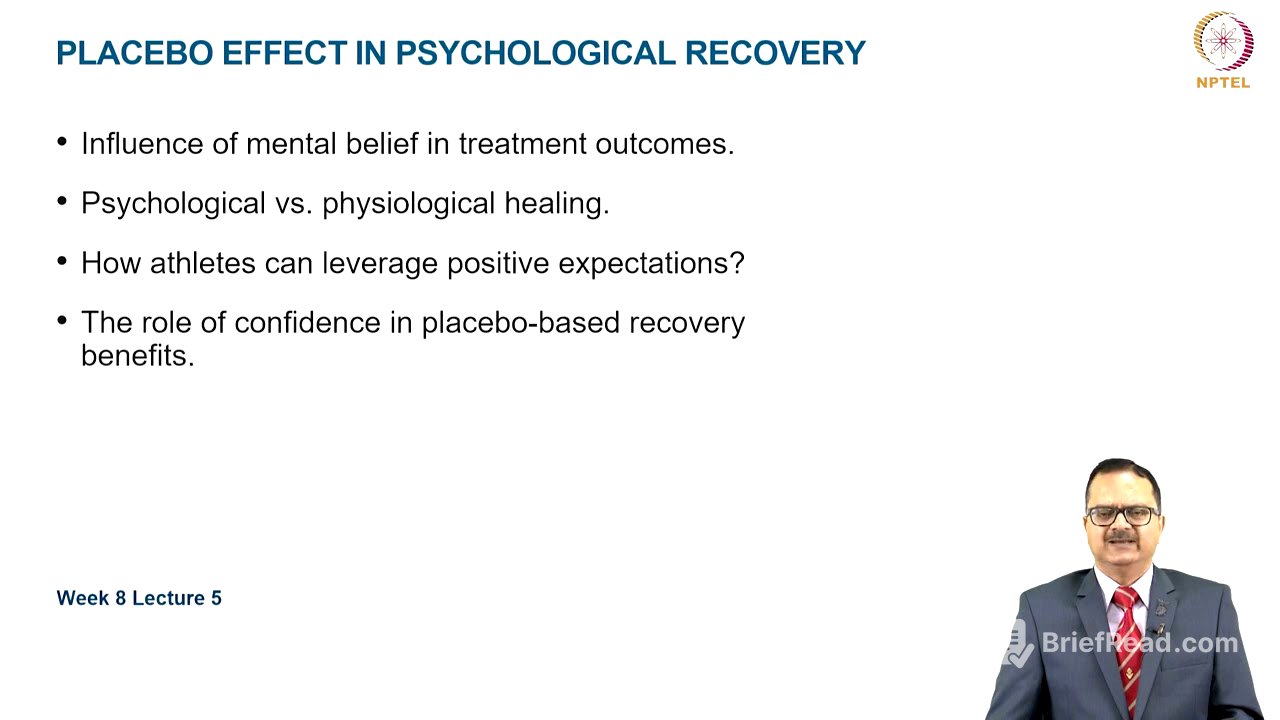TLDR;
This lecture discusses strategies for psychological rehabilitation post-injury in sports, emphasizing its importance in modern sports. It covers the psychological responses to injury, the role of social support systems, coping strategies, and mental training tools. The lecture also highlights the significance of early psychological intervention, the integration of mental training at the grassroots level, and the future trends in psychological rehabilitation, including the use of virtual reality and technology.
- Psychological rehabilitation is crucial for athletes recovering from sports injuries.
- Early intervention and a supportive environment are key to successful recovery.
- Mental training and coping strategies can enhance resilience and confidence.
Introduction and Objectives [0:15]
The lecture introduces the importance of psychological rehabilitation in sports injuries, now considered a prerequisite in modern sports. It emphasizes addressing mental health during recovery and understanding strategies for psychological rehabilitation. The aim is to equip sports medicine professionals, coaches, and physiotherapists to support sport psychologists effectively through interdisciplinary collaboration. The objectives include understanding the psychological effects of injuries, identifying rehabilitation techniques, enhancing mental resilience, discussing the role of support systems, and learning mental training tools for post-injury confidence.
Psychological Response to Injury [2:45]
The common emotional reactions to injury include shock, denial, anger, depression, and acceptance, with severity increasing in long-term rehabilitation. Factors such as age, skill level, peer and family support, and financial status influence an athlete's mental response. Psychological barriers to full recovery must be identified and addressed, given the prevalence of mental health disorders like depression and anxiety post-injury. Early identification of symptoms like aloofness, withdrawal, or aggression is crucial, necessitating prompt intervention by a sport psychologist or, in severe cases, psychiatric support and drug therapy to avoid hindering rehabilitation.
Fear of Re-injury and Identity Crisis [4:36]
Fear of re-injury and performance anxiety are significant psychological barriers to resuming training and competition. Techniques to rebuild confidence for return to play are essential, gradually reintroducing the athlete to sport to manage their fear. Cognitive restructuring techniques may be necessary for fear management. Athletes may also experience an identity crisis and loss of self-esteem due to feeling worthless after an injury. Strategies to rebuild confidence, career counseling for long-term injuries, and case studies of athletes who have overcome similar challenges can help in these situations.
Importance of Social Support Systems [5:49]
Teammates, coaches, families, and peers form crucial social support systems, offering psychological benefits that cannot be ignored. Maintaining connections with these individuals during rehabilitation is vital, as a positive team culture significantly impacts psychological healing. Sport psychologists play a key role, employing counseling techniques, cognitive behavioral therapy, and case studies. Early psychological intervention is highly effective in sports rehabilitation.
Mental Skills and Coping Strategies for Rehabilitation [7:00]
Athletes need to be taught mental skills such as visualization, positive self-talk, motivation, relaxation, and mindfulness exercises to develop mental toughness. The sport psychologist's role is crucial before, during, and after recovery. Coping strategies involve developing resilience through structured rehabilitation, setting goals, tracking progress, and encouraging a growth mindset. Psychological flexibility is essential to deal with setbacks during recovery.
Psychological Preparation for Return to Play [8:19]
Preparing athletes psychologically for their return to play involves building confidence post-injury and using exposure therapy to overcome fear. Managing expectations for performance recovery and ensuring appropriate expectations from the team are crucial. Gradual progression in return-to-play protocols should be ensured and monitored.
Rehabilitation Adherence and Motivation [9:05]
Several well-researched factors influence compliance with rehabilitation programs, and strategies should be in place to maintain motivation over time. Positive reinforcement from the support network and a connection between motivation and physical recovery are essential. Mindfulness and recovery meditation, including guided techniques for pain and stress management, can be beneficial. Case study discussions can demonstrate the efficacy of these modalities, reducing performance pressure upon return.
Placebo Effect and the Role of Coaches [10:27]
A strong placebo effect exists in treatment outcomes, with individuals holding stronger mental beliefs experiencing better results. Both psychological and physiological healing are equally important in the recovery process. Athletes should learn to manage positive expectations effectively, and place-based recovery should be utilized, exploring the role of confidence in placebo-based recovery benefits. Coaches play a vital role in psychological rehabilitation through effective communication, rebuilding athlete confidence, encouraging psychological resilience, and recognizing and addressing psychological struggles.
Family and Peer Influence [12:02]
Family and peer support are very important, with a strong correlation between emotional support and recovery time. Encouragement from peers improves the recovery mindset, and strategies should keep athletes engaged with their team members. Educating the family about mental health support for injured athletes is crucial.
Psychological Assessment Tools and Multidisciplinary Approach [12:40]
Sport psychologists have access to several psychological assessment and screening tools, including standardized questionnaires and mental health progress recovery questionnaires. Case studies are available to demonstrate the effectiveness of psychological assessments, and individualized recovery programs can be mapped and tweaked using these tools. Psychological recovery requires a multidisciplinary approach involving psychologists, physiotherapists, and coaches, with the entire medical and support team involved. Holistic rehabilitation programs integrating mental and physical recovery should be practiced, considering the role of nutrition and lifestyle in psychological healing.
Role of Virtual Reality and Technology [13:51]
Virtual reality (VR) and technology play a very important role in rehabilitation, with VR being used for mental conditioning post-injury and artificial intelligence assessment tools being used for rehabilitation. Future technological advancements in rehabilitation should be embraced, utilizing wearable technology for mental and physical recovery tracking in a judicious and scientific manner.
Success Stories and Sports Culture [14:32]
Examining success stories of athletes overcoming psychological barriers and learning from their rehabilitation plans is valuable. Different sports handle psychological recovery differently, with cultural variations in injury perception and recovery that should be considered. Creating a supportive sports environment and being aware of the impact of media portrayal on athletes' mental health are important.
Future Trends and Psychological Rehabilitation at the Grassroots Level [15:39]
Future trends in psychological rehabilitation include emerging psychological therapies and interventions, with an evolving role for sports psychology in sports rehabilitation. Mental training integration should be incorporated into injury prevention programs, and individualized mental health coaching should be offered to athletes, coaches, and support personnel. Mental training should be taught to youth athletes at the grassroots level, equipping them with coping skills for injuries and involving schools and academies in psychological resilience training to prevent long-term mental health issues.
Psychological Recovery Programs in Teams and Conclusion [16:54]
Teams can incorporate mental health strategies, with team psychologists managing athlete injuries. Practical strategies for integrating psychological support into training are essential, encouraging open discussions on mental health in teams. Psychological rehabilitation strategies are key to successful overall recovery, with mental well-being being important in recovering from severe injuries. Proactive psychological support in sports should be encouraged, fostering resilience in injured athletes. The future involves integrating psychology into sports medicine to shorten the rehabilitation process.









